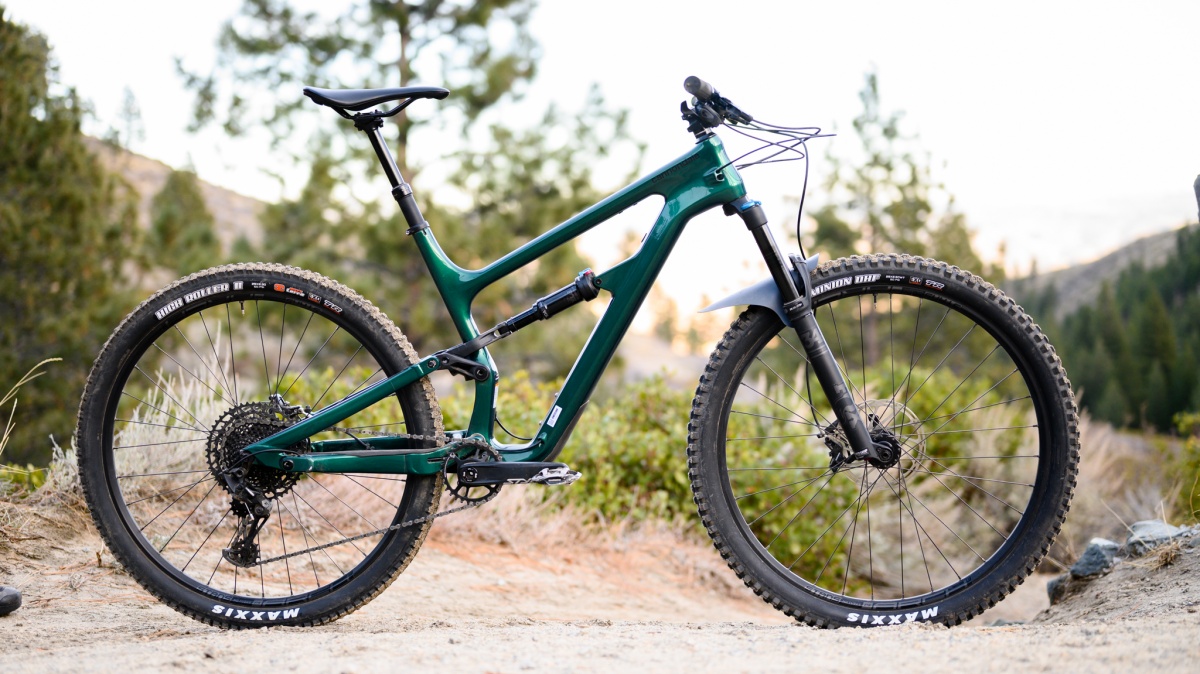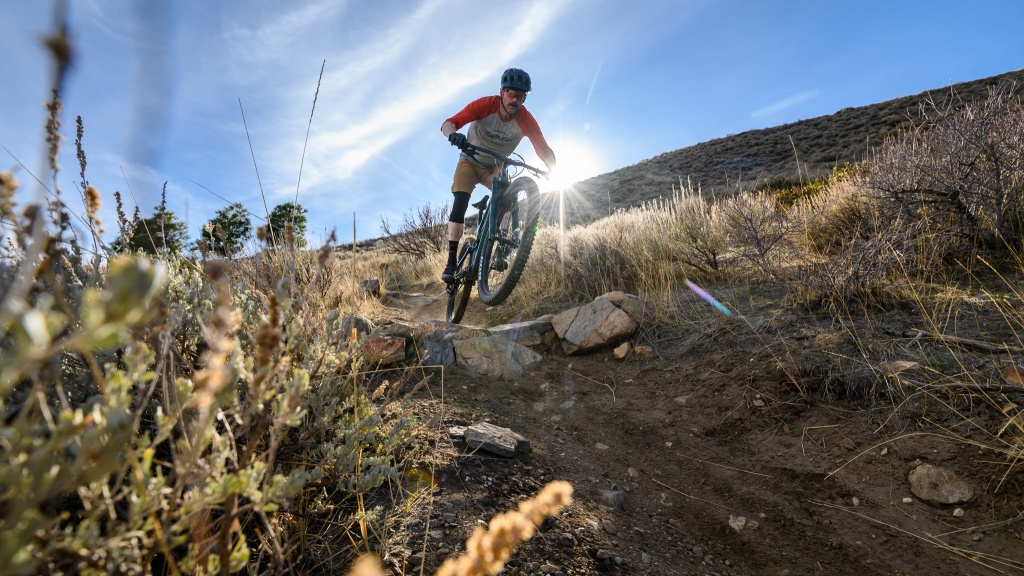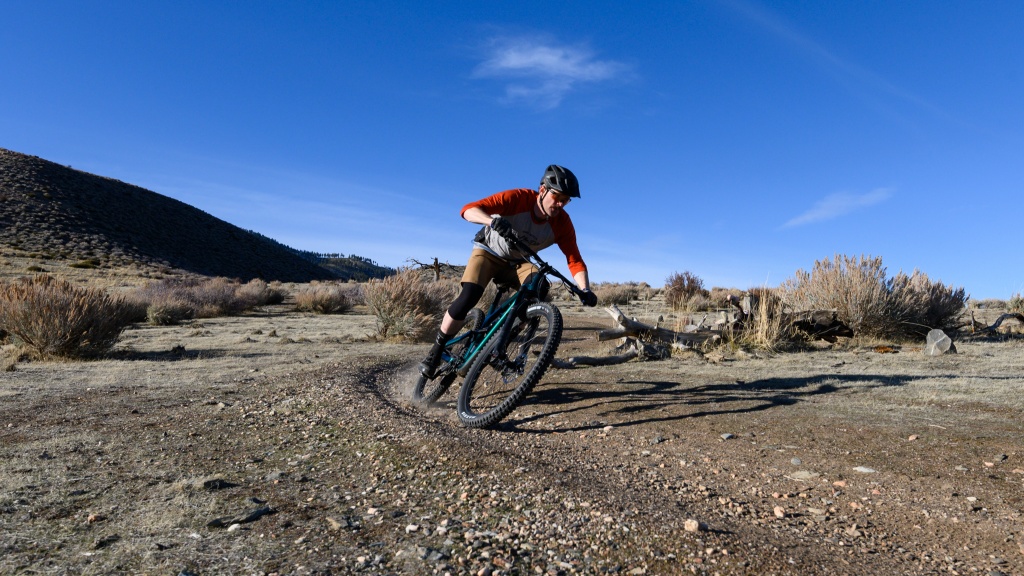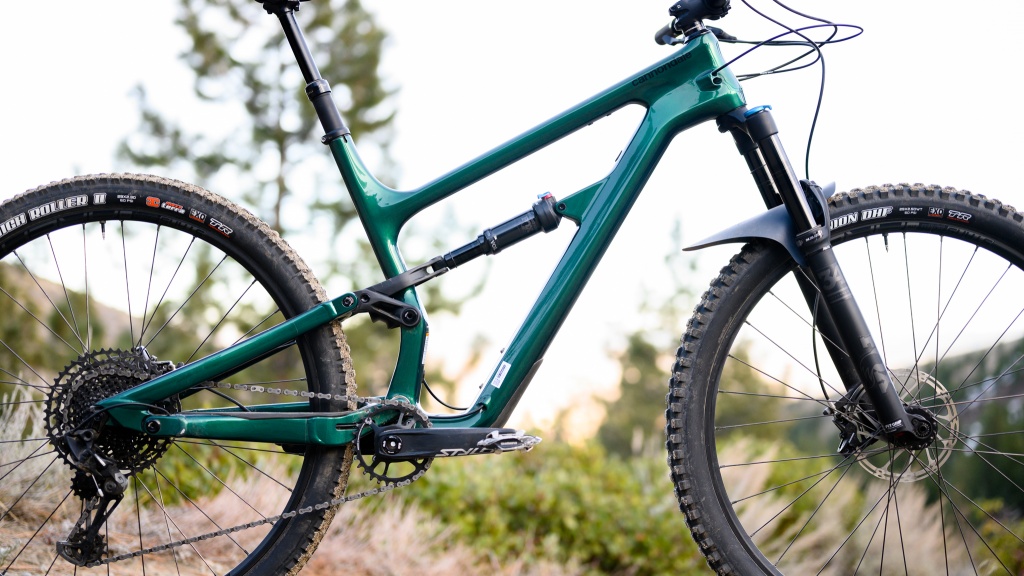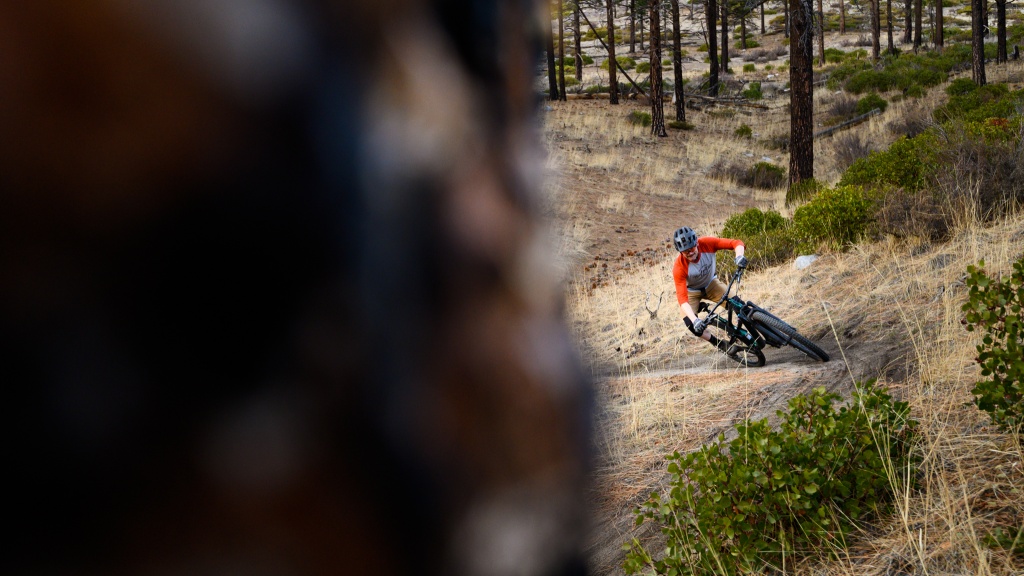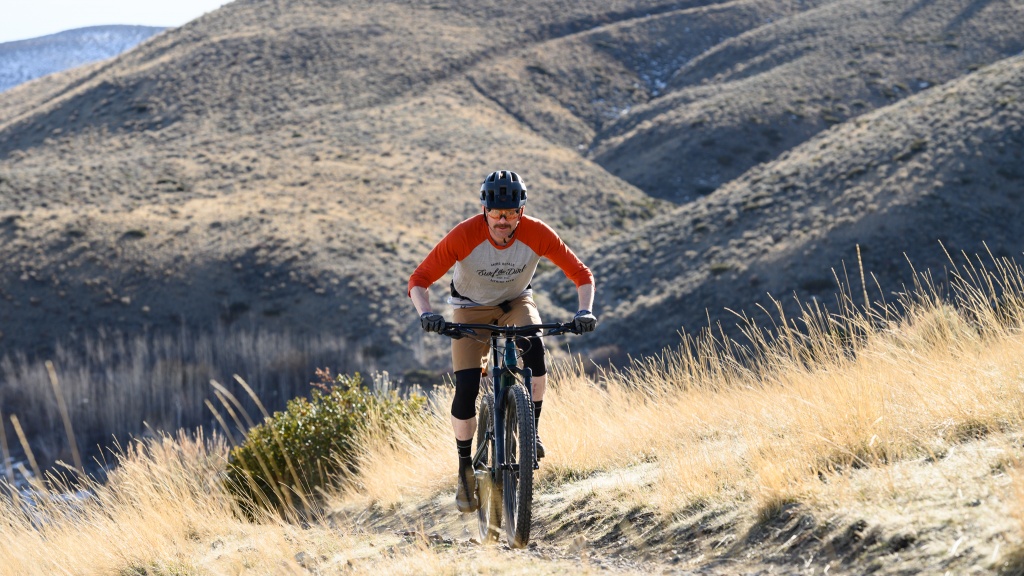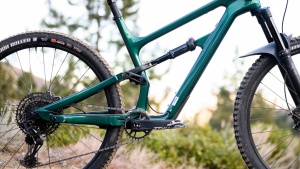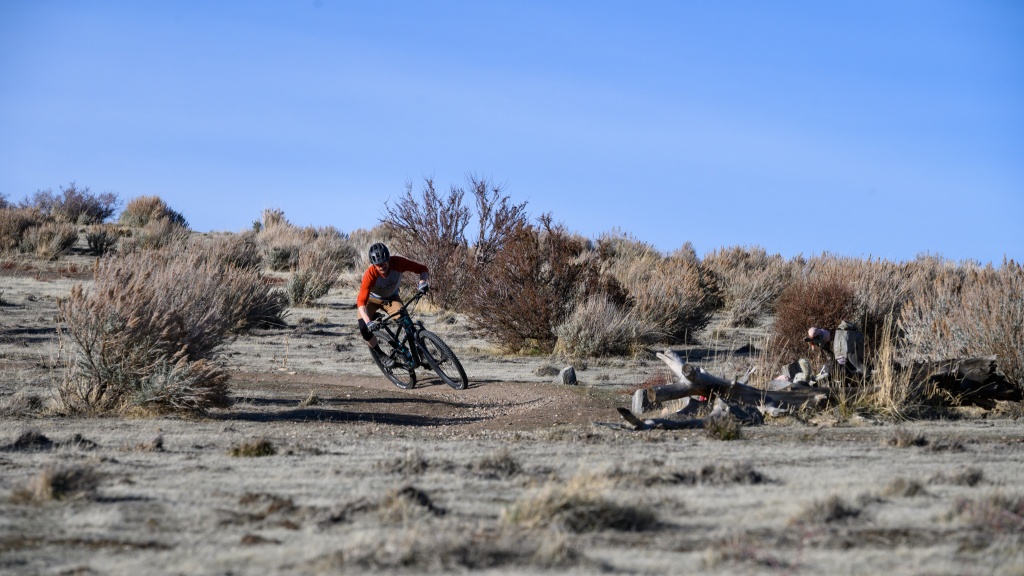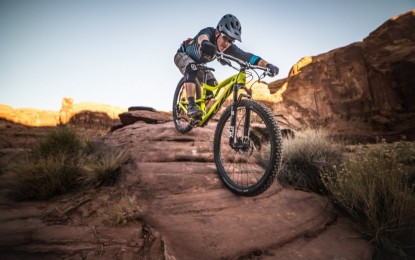Cannondale Habit Carbon 3 Review
Our Verdict
Compare to Similar Products
 This Product
Cannondale Habit Carbon 3 | |||||
|---|---|---|---|---|---|
| Awards | |||||
| Price | $4,200 List | $4,300 List $3,500 at Evo | $4,599 List | $2,999 List | $3,199 List |
Overall Score  |
|||||
| Star Rating | |||||
| Bottom Line | The Habit Carbon 3 is a relatively affordable and surprisingly hard-charging mid-travel trail bike | An innovative, highly adjustable longer travel trail bike that can span disciplines from everyday trail riding to bike park laps | An excellent value mid-travel trail bike with a crowd-pleasing, well-rounded performance | The aluminum framed Ibis Ripmo AF is the best aggressive trail bike you'll find at this price | Ibis' versatile and fun-loving short travel trail bike in a more affordable but slightly heavier aluminum-framed package |
| Rating Categories | Cannondale Habit Ca... | Specialized Stumpju... | Fezzari Delano Peak... | Ibis Ripmo AF NX Eagle | Ibis Ripley AF Deore |
| Fun Factor (25%) | |||||
| Downhill Performance (35%) | |||||
| Climbing Performance (35%) | |||||
| Ease of Maintenance (5%) | |||||
| Specs | Cannondale Habit Ca... | Specialized Stumpju... | Fezzari Delano Peak... | Ibis Ripmo AF NX Eagle | Ibis Ripley AF Deore |
| Wheel size | 29" | 29" | 29" | 29" | 29" |
| Suspension & Travel | Proportional Response - 130mm | FSR - 150mm | TetraLink - 135mm | DW-Link - 147mm | DW-Link - 120mm |
| Measured Weight (w/o pedals) | 31 lbs 5 oz (Large) | 31 lbs 14 oz (Large) | 30 lbs 5 oz (Large) | 34 lbs (Large) | 33 lbs 3 oz (Large) |
| Fork | Fox Float Performance 34 140mm | Fox 36 Rhythm - 160mm | Fox 36 Performance Elite, 150mm | DVO Diamond D1 160mm | Fox 34 Performance - 130mm |
| Shock | Fox Float Performance DPS EVOL | Fox Float DPX2 Performance | Fox Float DPX2 Performance Elite | DVO Topaz T3 Air | Fox Float DPS Performane EVOL |
| Frame Material | Carbon Fiber | FACT 11m Carbon Fiber | CleanCast Carbon Fiber | Aluminum | Aluminum |
| Frame Size | Large | S4 (Large equivalent) | Large | Large | Large |
| Frame Settings | Flip Chip | Flip Chip and Headtube angle | Flip Chip | N/A | N/A |
| Available Sizes | S-XL | S1-S6 | S-XL | S-XL | S-XL |
| Wheelset | Stan's NoTubes ARCH S1 rims with Formula hubs | Roval 29 alloy rims with Shimano Centerlock hubs, 30mm ID | Stan's Flow S1 rims with Stan's Neo hubs | Ibis S35 Aluminum rims with Ibis hubs, 35mm ID | Ibis S35 Aluminum rims with Ibis hubs, 35mm ID |
| Front Tire | Maxxis Minion DHF EXO 2.5" WT | Specialized Butcher GRID TRAIL T9, 2.6" | Maxxis Minion DHF EXO 29 x 2.5" | Maxxis Assegai EXO+ 2.5" | Schwalbe Hans Dampf 2.6" |
| Rear Tire | Maxxis High Roller EXO 2.3" | Specialized Eliminator GRID TRAIL T7, 2.3" | Maxxis Aggressor EXO 29 x 2.5" | Maxxis Assegai EXO+ 2.5" | Schwalbe Hans Dampf 2.6" |
| Shifters | SRAM NX Eagle | Shimano SLX 12-speed | Shimano SLX | SRAM NX Eagle | Shimano Deore 12-speed |
| Rear Derailleur | SRAM GX Eagle | Shimano SLX 12-speed | Shimano XT 12-speed | SRAM NX Eagle | Shimano Deore 12-speed |
| Crankset | Truvativ Stylo 6K DUB 30T | SRAM Descendant 7K 32T | Shimano XT M8100 32T | SRAM NX Eagle DUB 32T | Shimano Deore M6100 30T |
| Saddle | Fabric Scoop Shallow Sport | Specialized Bridge Comp | Ergon SM Stealth | WTB Silverado Pro | WTB Silverado 142mm |
| Seatpost | Cannondale DownLow Dropper 150mm | X-Fusion Manic 170mm (S4/S5), 34.9 diameter | X-Fusion Manic | KS Rage-i 150mm(Large) | KS Rage-i 150mm(Large) |
| Handlebar | Cannondale 3 Riser 780mm | Specialized 6061 alloy, 30mm rise, 800mm width | Fezzari FRD Charger 35, 800mm | Ibis 780mm Alloy | Ibis 780mm Alloy |
| Stem | Cannondale 3 | Specialized Alloy Trail stem, 35mm bore | Fezzari FRD Charger 35 | Ibis 31.8 50mm | Ibis 31.8mm 50mm |
| Brakes | SRAM Guide R | Shimano SLX 4-piston | Shimano XT 4-piston | SRAM Guide T 4 piston | Shimano Deore M6120 4-piston |
| Measured Effective Top Tube (mm) | 638 | 625 | 613 | 631 | 630 |
| Measured Reach (mm) | 458 | 475 | 480 | 473 | 475 |
| Measured Head Tube Angle | 66.5-degrees H/66-degrees L | 63-65.5 (adjustable) | 65.4-degrees H/65-degrees L | 64.9-degrees | 65.5-degrees |
| Measured Seat Tube Angle | 75-degrees H/74.5-degrees L | 76.9-degrees | 77.9-degrees H/77.5-degrees L | 76-degrees | 76-degrees |
| Measured Bottom Bracket Height (mm) | 337 L | 340 H/333 L | 345 | 340 | 335 |
| Measured Wheelbase (mm) | 1212 | 1247 | 1234 | 1239 | 1217 |
| Measured Chain Stay Length (mm) | 435 | 438 (S1-S4) | 434 | 435 | 432 |
| Warranty | Lifetime | Lifetime | Lifetime | Seven Years | Seven Years |
Our Analysis and Test Results
Should I Buy This Bike?
The Habit Carbon 3 is a hard-charging mid-travel trail ripper that makes the most sense for the rider who prioritizes downhill performance. This is a versatile bike with enough travel to ride just about anything, and an aggressive feel that can handle high speeds, chunk, and steeps like a bike with more travel. On the descents, the Habit has a stable, planted, yet playful attitude with great small bump compliance and good composure deep in the stroke on bigger hits. Its climbing performance left a bit to be desired, but it gets the job done on the uphills on all but the steepest sections of trail. While it may not be the most well-rounded bike in the mid-travel category, this is easily the best Cannondale model we've tested in years. If you're looking for a mid-travel trail bike for ripping fast and charging hard on the descents, we feel the Habit is a great option and a solid value for a carbon bike with a pretty nice build.
The Trek Fuel EX 9.8 is another ripping mid-travel trail bike. The Trek also sports 29-inch wheels and 140mm of rear-wheel travel, but it comes equipped with a beefy 150mm travel fork. The Trek's geometry is a bit more modern and progressive than the Habit, with a longer reach, wheelbase, and a slacker head tube angle. This bike performs well in virtually all downhill situations, and it does so with an even burlier and more confidence-inspiring feel. Additionally, the Trek's steep 77+ degree seat tube angle helps to give this lightweight bike a more energetic and inspired climbing feel. All that performance will cost you, and the Fuel EX 9.8 GX AXS build we tested retails for $7,699.
Frame Design
The Habit Carbon 3 features a Ballistec carbon fiber front triangle that is paired with a Smartform C1 alloy rear triangle. It has 130mm of rear-wheel travel that is controlled by Cannondale's Proportional Response suspension design. Proportional Response refers to the fact that the suspension platform is designed for each frame to optimize its performance across different sizes. It is a 4-bar linkage design that Cannondale claims has consistent anti-rise across frame sizes with higher leverage ratios, more progressive, for the larger sizes. This design has a pivot just above and slightly forward of the bottom bracket, with pivots on the chainstays just forward of the rear axle, and the upper linkage attached about midway up the seat tube. There are flip chips where the seat stays attach to the rocker link that allows the user to steepen the head tube angle by 0.5-degrees and raise the bottom bracket slightly. In typical Cannondale fashion, the rear triangle has a proprietary feature known as Ai (Asymmetric Integration) offset. This involves a normal 148mm rear axle spacing, but the whole wheel is shifted 3mm to the drive side. Cannondale claims this helps keep the chainstays short, makes more room for larger tires, and results in a stronger wheel. The frame has internal cable routing, integrated downtube and chainstay protection, and room for a water bottle in the front triangle.
We measured our size large test bike in the low setting and found that it had a 638mm effective top tube and a 458mm reach. The wheelbase was 1212mm with 435mm long chainstays and a 337mm bottom bracket height. The head tube angle was 66-degrees, and the effective seat tube angle was 74.5-degrees. It should be noted that the actual seat tube angle is a slack 66-ish degrees, and it felt slacker than the effective angle, especially for our taller testers. It weighed 31 lbs and 5 oz set up tubeless and without pedals.
Design Highlights
- Available in carbon fiber (tested) and aluminum frames
- 130mm of Proportional Response rear suspension
- Designed around a 140mm travel fork
- Ai offset rear wheel
- Flip Chip adjustable geometry
- Works with 29-inch (tested) or 27.5-inch wheels
- Integrated downtube protection
- Internal cable routing
- Available in sizes S-XL
- Women's models also offered
Downhill Performance
For a mid-travel trail bike, the Habit Carbon 3 has a decidedly hard-charging feel that begs to ridden fast on the descents. This bike feels aggressive, and it slays fast and flowy trails with a stable and planted feel and handles chunky and steeper terrain like a bike with more travel. The geometry is dialed for riding downhill quickly, and the component spec is good for the price and backs up the Habit's desire to let it run.
For a bike with just 130mm of rear-wheel travel, the Habit feels especially composed and ready to really rip on the descents. This bike definitely has a “more travel than it actually has” kinda feel, and it rides harder than its modest numbers suggest. The Proportional Response suspension design works well, and small bump compliance is solid, the mid-stroke is supportive, and our testers enjoyed the progressive ramp-up at the end of the stroke. It smoothes over high-frequency chop and trail chatter very well with enough progressivity deeper in the stroke to not blow through the travel on bigger hits. High speeds were especially confidence-inspiring, as this bike seemed to feel more stable the faster you rode. Handling is responsive and predictable, and the Habit rails high-speed corners as long as you keep your weight centered. Tighter turns are easily negotiable, though they required a good setup and proper line choice. It is worth noting that we found the rear shock pressures to be a little higher than usual on the Habit, approximately 40 psi more than we're used to running.
Cannondale designed the Habit with a relatively modern geometry that isn't extreme but really shines on the descents. They went with a long (wheelbase and reach), low (bottom bracket), slack (head tube), and short (chainstay) recipe that we found to work well and feel good at a huge range of speeds and variety of terrain. It also has flip-chip adjustable geometry to slacken/steepen the head and seat tube angles by 0.5-degrees and change the bottom bracket height by 6mm. We spent the majority of our time testing the Habit in the low setting, which we measured to have a 66-degree head tube angle and 337mm high bottom bracket. The 1212mm wheelbase promotes stability at speed without being so long that gets unwieldy at low speeds, and a 458mm long reach that was comfortable when just cruising or diving into something steep and chunky. The Habit's 435mm chainstays aren't crazy short, but they help to keep it reasonably playful, flick-able, easy to manual, and get the front end off the ground.
For the price, the component specification of the Habit is pretty solid and performs well on the descents. The Fox Float Performance 34 fork felt supple and is highly tunable, although it occasionally felt a little flexy when charging through chunk and chunder at high speeds. The Float Performance DPS rear shock worked well enough, and we had no complaints. The SRAM Guide R brakes felt powerful enough and had a great lever feel. The Stan's ARCH S1 rims performed well and went relatively unnoticed. The spec of a proper width Maxxis Minion DHF front tire and Maxxis High Roller II rear tire helped provide confident cornering and braking traction. The cockpit setup was mostly dialed, with a nice wide handlebar, short, stout stem, and shockingly comfortable Fabric lock-on grips. Cannondale's 150mm DownLow dropper worked well throughout testing, although it takes a little more force to compress than some.
Uphill Performance
The Habit performs just fine on the climbs, but we wouldn't call its uphill performance particularly impressive. Testers found it climbed the best on moderately pitched trails with relatively active rear suspension that maintained traction well over rocky sections. On steeper trails or in very tight uphill or technical sections, this bike felt a little long, and the slack actual seat tube angle came into play.
The Proportional Response suspension platform has a relatively active feel when climbing that promotes impressive traction on smooth and chunky trails alike. While highly active, the rear suspension doesn't have too much pedal bob when seated and climbing, though more than you might find on a more supportive platform like VPP. Those who like a more supportive platform will benefit from the use of the shock's 3-position compression damping/climbing switch. Out of the saddle, efforts felt pretty good and seemed almost necessary for scrambling over steeper sections and especially technical obstacles.
The Habit's geometry was a mixed bag on the climbs. Testers really enjoyed the long-ish reach and comfortable, roomy cockpit. The effective seat tube angle isn't egregiously slack, but at 74.5-degrees in the low setting, it is a little more relaxed than we're used to these days. What's more, the actual seat tube angle is right around 66-degrees, so the higher you position your saddle, the slacker it gets. Our long-legged 6-foot tall testers run a fair amount of post and felt like they were starting to hang farther off the back than they'd like. Couple that with the short chainstays and a slack head tube angle, and the Habit's front end wanted to wander or loop out on anything super steep. Our 5'10" tester with shorter legs was much closer to the effective seat tube angle at full saddle height, and his experience was better. However, he felt it still had somewhat lethargic and less sporty climbing feel than other bikes we've tested recently. At 31 lbs and 5 oz, the Habit isn't obscenely heavy, but it's a little heavy for a carbon bike, which plays a role in its less lively climbing feel.
The components on the Habit generally work well on the climbs. The SRAM GX derailleur provides good shifting performance and a huge range with the 11-50-tooth cassette paired with the 30-tooth chainring. Our testers were a little dismayed, however, by the NX cassette. While we understand the desire to save money on the complete build, the NX cassette is 154 grams, nearly 6 ounces, heavier than the GX version. Plus, should you choose to upgrade this component, you'll also have to upgrade your freehub body or wheelset to an XD driver. Otherwise, the Maxxis High Roller II provides admirable climbing traction on most surfaces, and the Fabric Scoop Shallow saddle is relatively comfortable.
Photo Tour
Value
At a retail price of $4,200, we feel the Habit Carbon 3 is a pretty solid value for a carbon fiber mountain bike. The build isn't particularly exciting, but Cannondale did a good job nailing most of the important aspects like the cockpit setup, tires, and suspension. There's nothing that immediately needs to be addressed to get out and start ripping on this bike. If you're looking for a mid-travel trail bike that slays on the descents, we think you'd be hard-pressed to find a better carbon model at this price.
Conclusion
The Habit Carbon 3 is a super fun and surprisingly capable mid-travel 29er. This bike is confident and a blast to ride downhill with excellent stability at speed and composure in rough and steep terrain. It loses points for its somewhat lethargic climbing performance due to its slightly “heavy for carbon” weight and slack seat tube angle. Otherwise, our testers found little they didn't like about this relatively affordable, for carbon, 130mm travel ripper. If you like to ride downhill fast but don't want the travel of an enduro bike, we feel the Habit is a fun option to consider.
Other Versions
Cannondale makes several versions of the mid-travel Habit trail bike in both carbon and aluminum frames. They make both men's and women's models with the primary differences being frame color and sizing. The women's models only come in XS, S, and M, while the unisex models come in S, M, L, and XL.
The Habit Carbon 1 is the top-of-the-line version that retails for $8,250. It comes fully decked out with a RockShox Pike Ultimate RC2 fork, a Super Deluxe Ultimate RCT shock, a full Shimano XTR 12-speed drivetrain, and 4-piston XTR brakes.
The Habit Carbon 2, $5,250, comes with a RockShox Pike Select+ R fork, a Super Deluxe Ultimate RCT shock, a SRAM XO1/GX drivetrain, and SRAM G2 RSC brakes.
The Habit Carbon 1 Women's has the same build and price as the model we tested, but it comes in a “champagne” color.
The Habit 4 has an aluminum frame and a price of $3,250. It comes with a Fox Float Rhythm 34 fork, a Float Performance DPS EVOL shock, a SRAM NX Eagle drivetrain, and SRAM Guide T brakes.
The Habit 5 and the Habit Women's 2 are essentially the same model at $2,700. Both bikes have aluminum frames, but they come in different colors and frame sizes. They have RockShox 35 RL Gold forks, Fox Float Performance shocks, SRAM SX Eagle drivetrains, and Shimano MT200 brakes.
The Habit Women's 3 and the Habit 6 are the least expensive models at $2,100. They come with RockShox Recon RL 130mm forks, a RockShox Deluxe Select rear shock, a Shimano SLX 11-speed drivetrain, and Shimano MT200 brakes.

